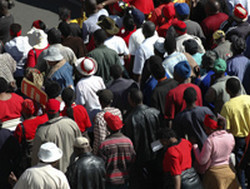African repression and protest
According to international indices, the SSA countries of Nigeria and Zimbabwe are both classified as repressive. Studying those regions reveals general principles about protest in authoritarian situations. The EU-funded project 'Protests in sub-Saharan African countries' (PROAFRI) studied political mobilisation in the target countries between 1995 and 2010. In addition, the study examined the effects of a repressive political context on organisational structures sustaining resistance mobilisation. The source of information was existing surveys of public opinion, which reflect individual engagement in demonstrations. The two-year study concluded in August 2013. Investigations underlined that repression can either defuse or trigger development of an organisational structure. While a moderate level of repression may trigger mobilisation, a greater military capacity combined with strict repression will deter and defuse mobilisation. Research also revealed that where protesters rely on a strong organisational structure, including networks with affiliate organisations, high rates of mobilisation result. Lastly, the work identified three conditions where organisations find alternative means of action, and thus maintain a stable organisation structure amid authoritarianism. The conditions include: violence, transnationalisation and a moderation of action options. Protest effort depends on the strength of protest organisations, and on the extent of international alliances. PROAFRI succeeded in clarifying the means by which protest organisations survive in repressive contexts. In addition, the research showed that when repression is cohesive across all arms of government, political challengers face minimal opportunities.







